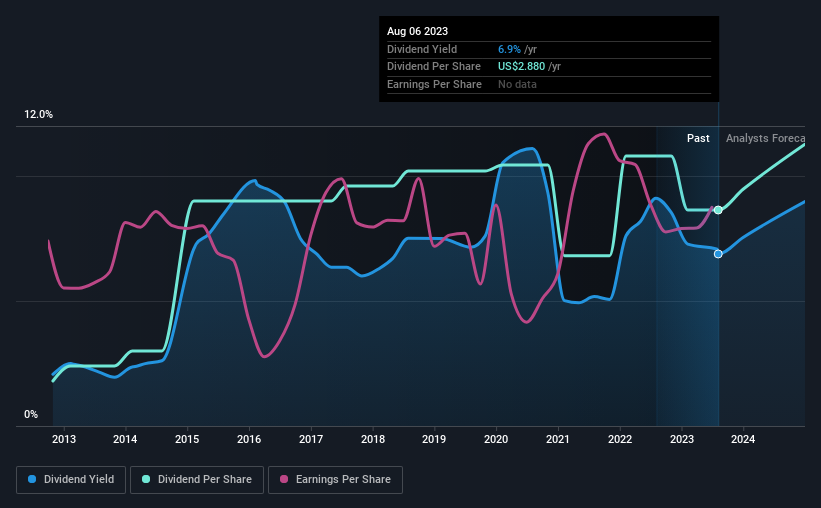Is It Smart To Buy CNA Financial Corporation (NYSE:CNA) Before It Goes Ex-Dividend?
Regular readers will know that we love our dividends at Simply Wall St, which is why it's exciting to see CNA Financial Corporation (NYSE:CNA) is about to trade ex-dividend in the next 4 days. The ex-dividend date is usually set to be one business day before the record date which is the cut-off date on which you must be present on the company's books as a shareholder in order to receive the dividend. The ex-dividend date is of consequence because whenever a stock is bought or sold, the trade takes at least two business day to settle. Therefore, if you purchase CNA Financial's shares on or after the 11th of August, you won't be eligible to receive the dividend, when it is paid on the 31st of August.
The company's next dividend payment will be US$0.42 per share, and in the last 12 months, the company paid a total of US$2.88 per share. Based on the last year's worth of payments, CNA Financial stock has a trailing yield of around 6.9% on the current share price of $41.85. Dividends are a major contributor to investment returns for long term holders, but only if the dividend continues to be paid. That's why we should always check whether the dividend payments appear sustainable, and if the company is growing.
See our latest analysis for CNA Financial
Dividends are typically paid from company earnings. If a company pays more in dividends than it earned in profit, then the dividend could be unsustainable. That's why it's good to see CNA Financial paying out a modest 45% of its earnings.
Companies that pay out less in dividends than they earn in profits generally have more sustainable dividends. The lower the payout ratio, the more wiggle room the business has before it could be forced to cut the dividend.
Click here to see the company's payout ratio, plus analyst estimates of its future dividends.
Have Earnings And Dividends Been Growing?
Companies that aren't growing their earnings can still be valuable, but it is even more important to assess the sustainability of the dividend if it looks like the company will struggle to grow. Investors love dividends, so if earnings fall and the dividend is reduced, expect a stock to be sold off heavily at the same time. With that in mind, we're not enthused to see that CNA Financial's earnings per share have remained effectively flat over the past five years. We'd take that over an earnings decline any day, but in the long run, the best dividend stocks all grow their earnings per share.
The main way most investors will assess a company's dividend prospects is by checking the historical rate of dividend growth. In the last 10 years, CNA Financial has lifted its dividend by approximately 17% a year on average.
The Bottom Line
From a dividend perspective, should investors buy or avoid CNA Financial? CNA Financial has seen its earnings per share stagnate in recent years, although the company reinvests more than half of its profits in the business, which could bode well for its future prospects. CNA Financial ticks a lot of boxes for us from a dividend perspective, and we think these characteristics should mark the company as deserving of further attention.
With that in mind, a critical part of thorough stock research is being aware of any risks that stock currently faces. Case in point: We've spotted 1 warning sign for CNA Financial you should be aware of.
A common investing mistake is buying the first interesting stock you see. Here you can find a full list of high-yield dividend stocks.
Have feedback on this article? Concerned about the content? Get in touch with us directly. Alternatively, email editorial-team (at) simplywallst.com.
This article by Simply Wall St is general in nature. We provide commentary based on historical data and analyst forecasts only using an unbiased methodology and our articles are not intended to be financial advice. It does not constitute a recommendation to buy or sell any stock, and does not take account of your objectives, or your financial situation. We aim to bring you long-term focused analysis driven by fundamental data. Note that our analysis may not factor in the latest price-sensitive company announcements or qualitative material. Simply Wall St has no position in any stocks mentioned.

